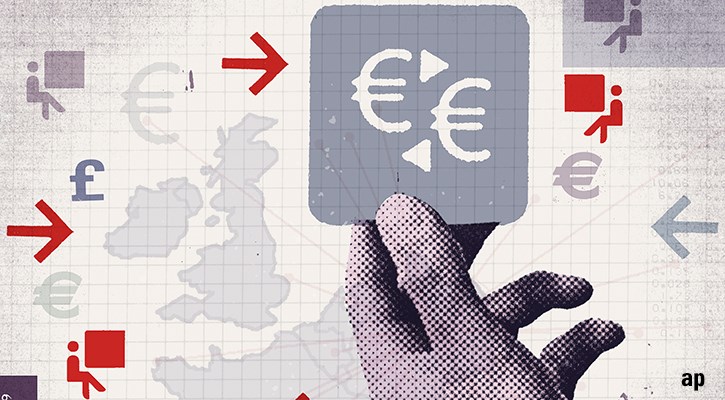
The Bank of England (BoE) today surprised markets by voting to hold interest rates at a record low of 0.1%, defying expectations for a rise to 0.25% and triggering market volatility across a range of assets.
Experts thought that this interest rate rise was "priced in" after many statements from Bank of England officials, including Governor Andrew Bailey who said the Bank was "ready to act" to tackle inflation, which is expected to reach 5% in spring 2022. In last week's Budget, the Chancellor, Rishi Sunak, had effectively teed up a possible move by the Bank of England by reminding the central bank of its remit to tackle rising inflation.
But according to the minutes of the Monetary Policy Committee (MPC), policymakers voted 7-2 in favour of no change to interest rates. The committee erred on the side of caution, reframing the decision in terms of employment rather than inflation, saying it is better to wait and see how the jobs market will handle the end of the furlough scheme, which ended in late September.
The Bank was expected to become one of the first developed market central banks to hike rates following last year's emergency cuts. Last night the Federal Reserve announced that it would start easing bond purchases, a process known as "tapering". This move was part of the unwinding of quantitative easing ahead of rate rises next year.
Markets React - But What Next?
The FTSE 100 immediately spiked on the announcement as City investors reacted to the surprise decision, while the pound slumped. Housing shares did well as mortgage borrowers were given a reprieve but financial stocks, which were relying on a rate rise to boost margins, struggled. Government bond or gilt prices rallied, apart from longer-dated bonds (bond rates and prices move in opposite directions.
Bank of England announcements had seemingly lost the power to surprise markets, but today was a reminder that central bankers can still create market volatility. There was criticism from some quarters of the Bank's communication ahead of today's decision and the lunchtime press conference - on what was expected to be Andrew Bailey's first rate rise after taking over the Governor role from Mark Carney.
“In our opinion, the press conference in particular must surely go down as one of the worst pieces of communication since the BoE gained independence in 1997, particularly on the part of the Governor Andrew Bailey," says Aaron Rock, rates and inflation at Abrdn.
Stock markets across the world, along with other asset classes, have been buoyed by "cheap money", both before and after Covid-19 struck. Higher interest rates increase borrowing costs for companies and consumers, reducing money to spend on goods and services and raising the price of credit. So any delay to the inevitable tightening of monetary policy is seen as welcome (if temporary) good news for investors, if not for savers, who were expecting some sort of reprieve from dismal cash rates.
Tightening Agenda
Could this be just delaying the inevitable, and should investors be braced for rate rises in December? There seem to be consensus among economists that despite no movement on interest rates today, the signposts are all pointing towards a hike. Anna Stupnytska, global economist at Fidelity International, is now looking ahead to December.
She says: “The decision might raise concerns about the BoE credibility as an inflation targetter, especially following recent hawkish comments from MPC members including Governor Bailey. But as the inflation narrative should continue dominating markets in the near term, a December hike now seems highly likely.”
"The tightening agenda is still there," says Seema Shah, chief strategist at Principal Global Investors, with the Bank of England retaining its stance that interest rate rises are still coming - just not yet.
For Steven Bell, chief economist of BMO GAM, the economic picture remains the same despite today's apparent change of heart.
"Inflation has risen significantly, there are signs that it is not simply a transitory move; moreover, the economy has recovered significantly, and, despite the squeeze from the Chancellor’s Budget, should continue to expand. Monetary policy was put into emergency mode due to the pandemic. The emergency is now largely over and monetary policy should adjust accordingly."
Still, the Bank of England's minutes suggested that investors hoping for a sustained period of economic growth may be disappointed - and this has implications for both shares and funds that are focused on the domestic economy.
"Over the second half of the forecast period ... UK GDP growth is expected to be relatively subdued. The pace of growth slows as potential supply growth eases back towards pre-Covid rates, and as higher energy prices and the fading of monetary and fiscal policy support temper demand growth," the Bank said.
Where Else for Income?
Ben Kumar, senior investment strategist at 7IM, investors hunting for yield in a low-yield world, should still be looking at more risky fixed income assets and even alternatives.
“Iinvestors should be preparing for a decade in which inflation is more of a challenge to their portfolios,” he says. “Investors should be looking for opportunities now that are designed to do well in a rising-rate environment, even if the prospect of rate rises is far in the future as it is only a matter of when, not if.
"Being positioned to be underweight in government bonds, overweight in alternatives, overweight in value and underweight in tech are good examples of what investors can do to start preparing for rising interest rates.”
Susannah Streeter, senior investment and market analyst at Hargreaves Lansdown, notes the mixed effect on UK shares, with housebuilders gaining but banks struggling.
“With no splash of cold water imminent to cool down the red-hot housing market, the expectations are that demand for new homes will continue to be brisk as the race for space continues. But there was disappointment for banks which had been holding out for some relief from the record low rates which have eaten into their lending margins. Lloyds, which earns the majority of its income from traditional lending activities, saw its share price fall by 2%, as did NatWest, while Barclays fell by around 1%.”




























